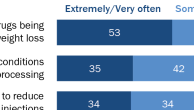To me, there are two types of breaking news in health care: the macro and the micro.
Macro health news breaks when there is a natural disaster, a scientific breakthrough, or a new twist in a policy debate (see: “ACOs“). I read up on the facts and try to make sense of the latest turn of events, but usually from a comfortable distance.
Micro health news breaks when a loved one gets a serious diagnosis. Then I follow the unfolding health care story with intensity and I care more about the outcome.
Nancy Shute of NPR pulled off a nice trick when she reported on how one online community swarmed to the rescue of a woman who was recently diagnosed with a rare condition. The story grabbed my attention with micro intensity but was able to make a macro point: “Web Communities Help Patients With Rare Diseases.” By the end of it, it mattered to me that one woman’s kidney was saved thanks to a Facebook group. I bet it mattered to a lot of listeners, not just because it was a good story, but because it resonates with their own experiences. Pew Internet’s research shows that 1 in 4 internet users living with chronic disease go online to find other people with similar health concerns. The report Peer-to-peer Healthcare also chronicled how those connections can make all the difference in the world, especially among people living with rare disease.




